Auck’s On Time Train Target 85%
Auckland Transport has set a train performance target of 85% punctuality (trains arriving at their destination within five minutes of their scheduled time).
In a email to reader Karl, AT admits that the performance level is “quite low by some international standards,” but takes account “of the condition of the assets (tracks and signalling equipment) and the age of the equipment (trains).”
It’s an appropriate day to discuss it after some commuters’ experiences as can be seen in the most recent Today’s Chat comments:
Wellington’s Tranz Metro, which is still struggling with old trains, says it has a performance target to run at least 95% of our trains on time each month. Tranz Metro says:
“This is an achievable target for a rail network with modern, reliable trains and modern, reliable infrastructure. Our network upgrade and new Matangi trains will provide this for us in the future. We determine a train to be on time if it arrives within 3 minutes of the scheduled arrival time. Auckland trains and many other overseas regions and rail companies use a 5 minute benchmark for their arrival times.”
New York claims last year 96% of its trains were on time. Melbourne is contracted to be at least 86% punctual. Until this week’s disasters, Tokyo trains aim to be 100% punctual and apologies are made if more than a minute late.
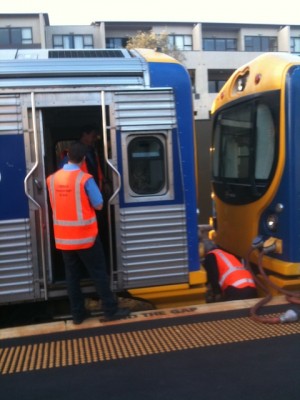 So back to Auckland: Kurt asked Auckland Transport:
So back to Auckland: Kurt asked Auckland Transport:
“I would like to question what is to be done about the poor performance of Veolia in regard to the operation of the Auckland rail network. Even in their own statistics they admit that their trains are only on time around 70% of the time. Where else, other than in the third world, would this be deemed acceptable? A large number of rail patrons are getting frustrated with the lack of accountability for the performance, or not, of the rail service providers.
What power does Auckland Transport have over the operator? Surely, there would be some heavy penalties for the poor performance. If not, what is the threshold for acceptable performance for the rail network?”
“Auckland Transport is aware of a number of factors that have been influencing the ability of Veolia Transport to deliver the timetabled services in a timely manner. Auckland Transport has a target of 85% punctuality (trains arriving at their destination within five minutes of their scheduled time), a performance level that, while quite low by some international standards, takes account of the condition of the assets (tracks and signalling equipment) and the age of the equipment (trains).“The trains are owned by Auckland Transport and while these have been refurbished, the engines that power them are more than 40 years old and prone to in-service failure. You may be aware that funding has been secured to purchase new electric trains to be introduced from 2013 and these will be significantly more reliable than the current fleet. In the meantime, Auckland Transport as the owner and Veolia Transport as the train operator have been working closely with train maintenance to ensure that they are kept in a safe and reliable condition.
“The tracks the trains run on and signalling system that controls train movements are owned and managed by the government organisation KiwiRail. At the present time KiwiRail is making improvements to the tracks and signals in preparation for the operation of electric trains. This includes a complete replacement of the signals and related control equipment appropriate for the 21st Century and relaying and upgrading large sections of track to improve clearances under bridges for the overhead wires that will be provided for the electric trains, and also to improve the ride quality for passengers using trains. In the same way as road works cause delays to road users, the work on the rail network are disruptive. Unlike roads, however, there are no alternative routes to avoid the disruption.
“Over the Christmas/New Year period, KiwiRail replaced a number of lengthy sections of track. When the trains returned to operation they were required to travel slowly through these sections to allow the track to settle properly. It would be unsafe for trains to travel at normal speed following such work. Under the circumstances, the services could not maintain their scheduled timetable leading to a decline in service performance. Over Auckland Anniversary weekend at the end of January, KiwiRail was able to carry out final work that allowed most of the speed restrictions to be removed and this has had an immediate positive impact on the performance during February.“In addition during January train services were affected by a Police incident at Britomart and flooding of the Britomart tunnel during the cyclone on 23 January, both of which caused a temporary suspension of services and impacted on the overall monthly figures.
“It would be unreasonable to penalise Veolia Transport for incidents that affect the train performance which are outside their control. The vast majority of service delays are directly related to the long term upgrade work being progressed in preparation for the introduction of electric trains.
“Auckland Transport does, however, expect Veolia Transport to keep the passengers informed when there are delays that impact on their travel and we are working closely with Veolia to enhance the range of tools available for this purpose. New electronic signs at stations that will show train arrival and departure information in real time, as opposed to the scheduled time used on such signs now, will be gradually introduced starting this year. Work continues to progress on upgrading the track and signals and while this may result in service disruptions in the future, the eventual outcome will be a modern reliable system with modern trains.
“In the meantime we apologise for the inconvenience caused by the upgrade work and thank you for your patience.”
Here was the February performance for Veolia:
Of the 7585 services scheduled for February, 98.4% arrived at their final destination and 83.1% were on time.
Veolia said that by working with KiwiRail to remove some of the speed restrictions in place on the network we were able to deliver an improvement in the overall performance this month.
Train performance was affected by the following specific events:
- There were two consecutive signal faults at Britomart on February 3 as well as a signal fault at Morningside on February 9, which together delayed 56 services including 8 cancellations.
- A major disruption in communications between train control in Wellington and Westfield on February 7 delayed 77 services resulting in 14 cancellations.
- A points failure at Morningside on February 8 caused delays to 28 services including 4 cancellations, and a broken down freight train at Papakura on February 11 delayed 11 services.
As Wellington heads for an era of Matangi, the weekly performance for March 13 (yes they give out weekly performances, not monthly ones weeks after a month ends):
Johnsonville 94% on time
Kapiti 82%
Upper Hutt 82%
Wairarapa 40%
BTW, the NY Times investigated its city’s train punctuality last year and concluded that 96% on-time performance doesn’t mean that 96% of customers get where they’re going on time — only that 96% of trains did, counting nearly empty trains at 10:00 PM when there’s plenty of spare capacity on the rails, and a lot fewer causes of delay.
And here are the London underground performance stats for December:
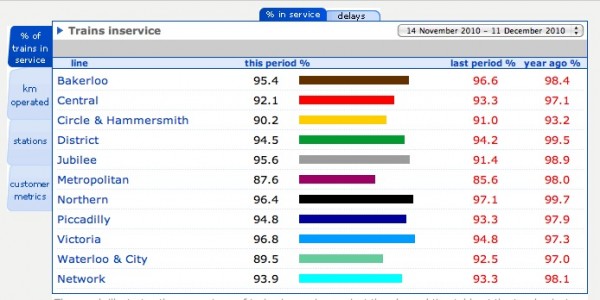
And these were the Tube delays for that period (delays being 15 mins or more)
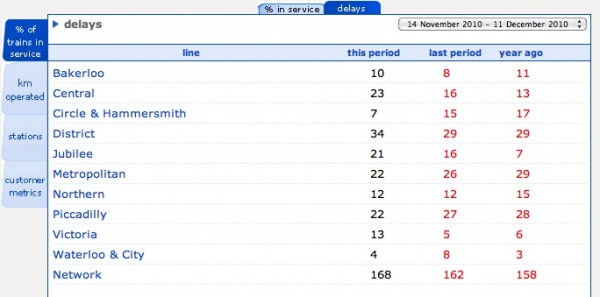
So is a 85% target good enough?

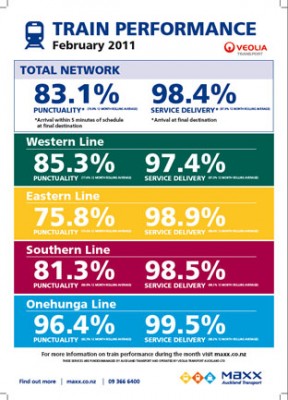
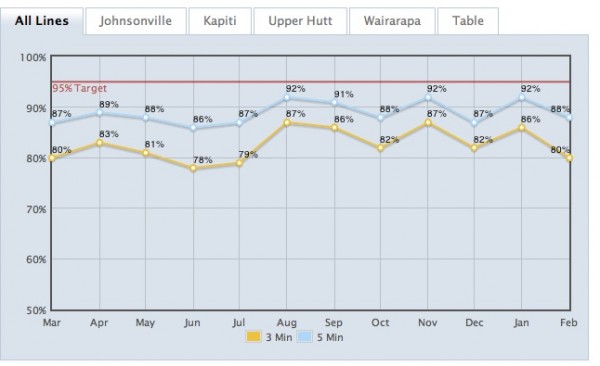










10 Comments
The 12 month moving average for punctuality since September 2010 goes 79.2%, 78.9%, 78.6%, 77.9%, 77.7% and 78.9 so there has not been any significant improvement in performance and we can infer that management thinks that lateness of between 20 and 25% is OK. Setting the target at 85% is a bunch of horse feathers designed to ward off calls for someone’s head on a stick.
I wonder if Veolia or Auckland Transport tolerate their employees being late for work between 20 and 25% of the time?
The pretty usual excuses it seems.
If we take out those specific cases out of the equation they still are only 84.9% on time which is pretty bad considering they allow trains to be up to 5 minutes late.
The same old same old continues though, lack of communication.
For example last night (17/03/11) the 7.41 PM train from Sylvia Park to Britomart arrived sometime just after 7.55. Hardly peak hour pressure and they were only using two of the four cars.
No announcements, no nothing.
And is the central train control based in Wellington reliable? . This set up seems to have a huge potential for problems.
Auck's OnTime Train Target 85% - Featured - AKT…
Here at World Spinner we are debating the same thing……
So we have one party operating the tracks and signaling, a second party supplying and driving the trains, a third party seated in Wellington playing computer games and you are blaming the charming lass who clipped my ticket last ride?
Don’t forget the fourth party who own some of the trains, provide some of the LEs, and maintain the rolling stock….
and three of the parties are the same company!
85%???? What a joke. Most other train systems have AT LEAST 95% punctuality* requirements, after which penalties fall on operators.
*Punctuality in other cities usually means a maximum of 3 or 4 minutes late at the end of the run. Auckland’s 5 means that the statistics cannot be compared.
I’m sure we’d all like it to be higher, but getting 85% might be more achievable given what we’ve seen in the past:
http://www.aktnz.co.nz/2011/03/01/veolias-woeful-punctuality/
It would be better though to set a high commonly accepted target that would be more of a benchmark than arbitrarily choosing numbers that suit the council Auckland Transport and it’s operator.
Auckland’s rail system has made great progress, and continues to do so, but until electrified will remain a very lumbering and slow system. DC hauled push/pull trains in particular, while fun to ride in from a rail enthusiast viewpoint, lumber away from stations like a 500 tonne freight train - you can hear then notch up for quite a few seconds before they even start to move off from a station - so frustrating.Then there are the steep grades up to Newmarket from the south with its many stops and Britomart (so slow up those hills with diesels its a joke ) and the ridiculous very sharp rail curves (eg Parnell/Quay Junction) that would cost $100′s of millions (if not more) to fix - all make for slow rail speeds. EMU’s will definately help as they will be much quicker to accelerate and brake from stations and on hills and so timekeeping will benefit. Also there is a lack of urgency by the operator (Veolia) and network provider (KiwiRail) often to get trains away on time - this seems a New Zeland trait thing which affects our bus PT as well. Some people need to sharpen up, smell the coffee and not loiter around - particulalrly noticeable from some Network provider/operater staff - hasten to add by no means all and some are really on to it!